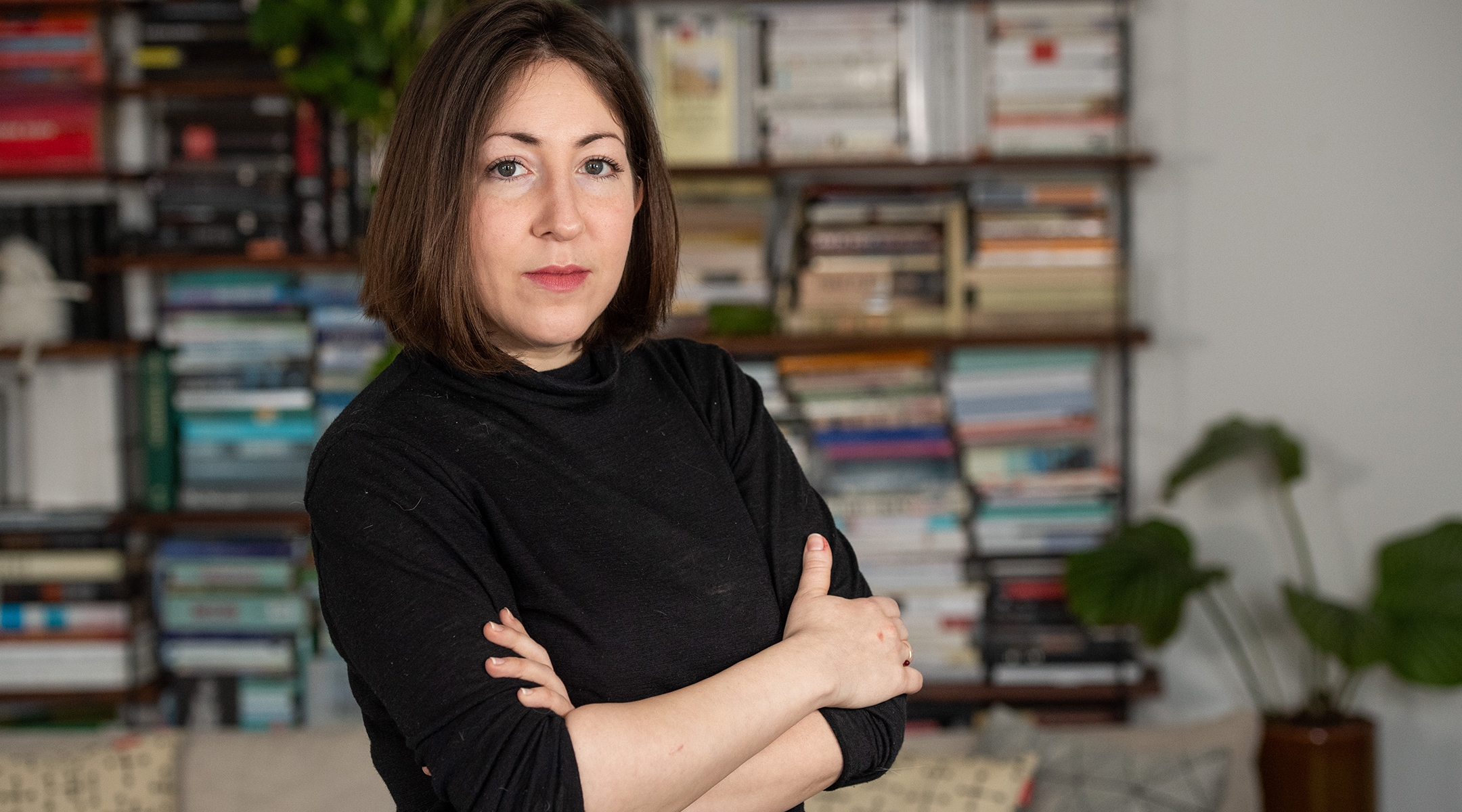‘Unorthodox’ author Deborah Feldman is a lightning rod in Germany’s debate about criticizing Israel
The controversy hits a nerve in Germany, where criticism of Israel has been subject to intense scrutiny since the Holocaust. But there is a growing thirst for Jewish voices to break the supposed taboos

Deborah Feldman poses in her living room in Berlin, March 10, 2020. (Christophe Gateau/picture alliance via Getty Images)
(JTA) — The TV series “Unorthodox” took the world by storm in 2020. Now, recent comments about Israel by the story’s Berlin-based Jewish heroine, author Deborah Feldman, have created a storm of another kind.
Feldman, 37, a dual American-German citizen, rose to fame through her story of fleeing the Satmar Hasidic community of Brooklyn to the welcoming streets of Berlin. She is now making the rounds of German and British media, unabashedly criticizing Israel’s war against Hamas and taking umbrage at what she considers Germany’s misguided support for the Jewish state.
Her pet peeve: German eagerness “to lecture us on how any criticism of Israel is antisemitic.” On a recent talking heads TV program on the broadcaster ZDF, German Vice Chancellor Robert Habeck said “Israel has the right to defend itself and Germany has the obligation to stand by Israel.”
“Israel must also adhere to international law and do everything in its power to protect civilians,” he said. “But Israel’s task is almost impossible since Hamas hides behind civilians.”
With Habeck listening remotely on a big screen behind her, Feldman, the granddaughter of Holocaust survivors from Hungary, told him she was “appalled” that Jews are “selectively protected” in Germany. Though antisemitism is on the rise, she said, “sometimes empty synagogues” get police protection while other places where Jews gather — such as kosher restaurants or Jewish museums — have to take care of themselves. JTA has not confirmed this, and Feldman and her attorney have not responded to JTA requests for comment.
Feldman has garnered support from some, derision from others. The controversy hits a raw nerve in Germany, where criticism of Israel has been subject to intense scrutiny for decades after World War II. But there has long been a growing thirst for Jewish voices to break the supposed taboos.
Most Jews in Germany rush to Israel’s side in times of crisis, whether or not they like the country’s government and its policies towards the Palestinians. German politicians and mainstream Jewish organizations, such as the Central Council of Jews in Germany, usually dismiss voices like Feldman’s as an annoying fringe phenomenon — but Jewish leadership has become increasingly uncomfortable with the dynamic.
In the latest issue of the New York Review of Books, Berlin-based American Jewish scholar Susan Neiman decried Germany’s “silencing of critical Jewish voices,” including Feldman’s.
Neiman, director of the Einstein Forum foundation in Berlin, noted that several venues had canceled events promoting Feldman’s new book, “Judenfetisch” (“Jew Fetish”), which argues that German guilt over the Holocaust has distorted its relationship to Jews and Israel. Neiman also said the Chabad Lubavitch movement in Berlin is “suing Feldman to take the book off the shelves.” JTA has learned that Chabad won its suit on Nov. 1 over a false allegation related to state funding for Ukrainian-Jewish refugees in Berlin. Books on the shelves of shops can stay where they are, but the offending material will be removed from future editions, said Chabad’s attorney Nathan Gelbart.
Some book tour events may have been canceled, but Feldman, who moved to Berlin in 2014, has still been getting plenty of publicity, noted writer Mirna Funk — “more than any of us,” said Funk. The German-born Jewish novelist and journalist recently shared the Arik Brauer Journalism Prize from the Vienna-based Middle East think tank Mena-Watch for writing on the Middle East, with Israeli-German psychologist and author Ahmad Mansour.
“Deborah has no idea about Jews in Germany and no idea about Israel, but since Oct. 7 German media has dragged her onto many TV shows and quoted her in many newspapers,” Funk said in an Instagram post.

Author Mirna Funk, shown in 2020, thinks that Feldman is getting more air time than German-born Jews. (Gerald Matzka/picture alliance via Getty Images)
“The woman comes from an anti-Zionist sect in Brooklyn and is considered a representative of Germany’s Jewish community,” Funk wrote. “It’s slowly getting to the point where I can only stand it all if I can beam myself 15 years or so into the future and look back on this time, after the nightmare is over.”
Though German foreign policy has been overall very supportive of Israel, popular support for the Jewish state has waned steadily since the 1960s. Politics reflects that shift, with increasing government criticism of Israel’s settlement policy over the years. Germany no longer automatically stands up for Israel in European Union and United Nations forums.
Sacha Stawski, president and founder of the Frankfurt-based pro-Israel initiative Honestly Concerned, agreed that there is a distinct popular appetite for Jewish Israel critics.
“People like Deborah Feldman have made a business model out of being anti-Zionist, and being outspoken Israel haters,” Stawski told JTA.
Such critics are “well-received guests on all the major talk shows,” he said. “For somebody like Feldman to claim that people are trying to shut her up and that she’s not able to raise her voice is the greatest bullshit I have ever heard.”
Feldman and Neiman also are among the more than 100 signatories to a recent open letter in N+1 magazine from Jewish writers, artists and intellectuals in Germany, condemning what they describe as an indiscriminate crackdown on voices critical of Israel. The letter was also published in German in the left-wing daily Tageszeitung.
The letter was the brainchild of American writer Alex Cocotas, 36, who moved to Germany eight years ago after living in Israel for a couple of years. It started as a text message to a handful of friends who, like him, were “horrified about what was happening in Israel, but also about what was happening here in Germany as well,” he told JTA.
What triggered the action was a government ban on certain statements and symbols at pro-Palestinian demonstrations following Oct. 7. After participants in one Berlin rally celebrated the brutal attack, German Chancellor Olaf Scholz announced that the group that called for the rally would be banned. Schools in Berlin were told they could also bar the wearing of the Palestinian flag, keffiyeh headscarves and other pro-Palestinian symbols.
It was such broad measures that the open letter targeted. While condemning the Hamas attack, the writers said the banning of “public gatherings with presumed Palestinian sympathies” — including those called by Jews — serves to “suppress legitimate nonviolent political expression that may include criticisms of Israel.”
Cocotas said that despite his efforts to reach the mainstream Jewish community in Germany, most of the signatories were American or Israeli Jews living here.
In laws shaped by the post-war reckoning with its National Socialist past, Germany bars Holocaust denial and the use of Nazi slogans and symbols. Germany also has formally accepted the International Holocaust Remembrance Alliance’s working definition of antisemitism, which includes the denial of Israel’s right to exist as a form of antisemitic hate speech.
“In the U.S. you can deny the Holocaust in public, and you will not be prosecuted,” said Cocotas, adding that he recognized the differences between German and American laws. But “I don’t consider ‘Free Palestine’ to be an antisemitic statement. It should be protected speech.”
His concerns echo those of Germany’s commissioner on antisemitism and Jewish life, Felix Klein, who recently told the Guardian newspaper that the broad restriction of protests was “worrying,” because “demonstrating is a basic right.”
“It’s unfortunate that it’s a very small group of Hamas supporters and people that are hating Israel that cause all this trouble,” Klein said.
Another American transplant to Berlin, William Glucroft, told JTA that he believes the restrictions are deeply problematic. “As a writer and journalist, I can only be for unfettered access to public expression,” Glucroft, who signed the open letter, told JTA in an email. “As a Jew, my safety and well-being are only thanks to democratic ideals of equal protection and rule of law. That has to be there for everyone.”
“Germany’s understanding of its history leads it to think it owes something to Israel, a country that did not exist” during the Third Reich, he continued. Germany itself “blurs the line between Jews and Israel, which endangers Jews and by the IHRA definition that Germany itself endorses, is antisemitic.”
Micki Weinberg, founder of the Berlin based SHIUR Jewish learning project, also received the open letter. But he declined to sign.
“I completely understand one’s interest to have empathy with the Palestinians — and I do — but that doesn’t mean ignoring attacks on Jews and denigrating a legitimate fear,” he told JTA by text message.
“If the letter simply acknowledged the real risk of antisemitism within Islamist and pro-Palestinian/Anti-Israel groups and asked for a separation between legitimate pro-Palestinian demos and antisemitic pro-Palestinian demos, then that would be fine.”
Funk, who calls both Berlin and Tel Aviv home, said she was surprised to find the name of an Israeli friend among the signatories.
“I texted him after I saw his name on the list: ‘What the f— are you doing?’ There is a huge disconnect between the established Jewish community in Germany and the Israelis,” she said. “They simply don’t understand Germany.”
“I would not sign, because Palestinians are not suppressed,” she said, noting that there are 5.5 million Muslims in Germany and about 100,000 registered members of Jewish communities.
“They are not being silenced,” said Funk. “They are demonstrating on the streets every f—ing day for Gaza. So I don’t know what they are talking about.”
This article originally appeared on JTA.org.





















